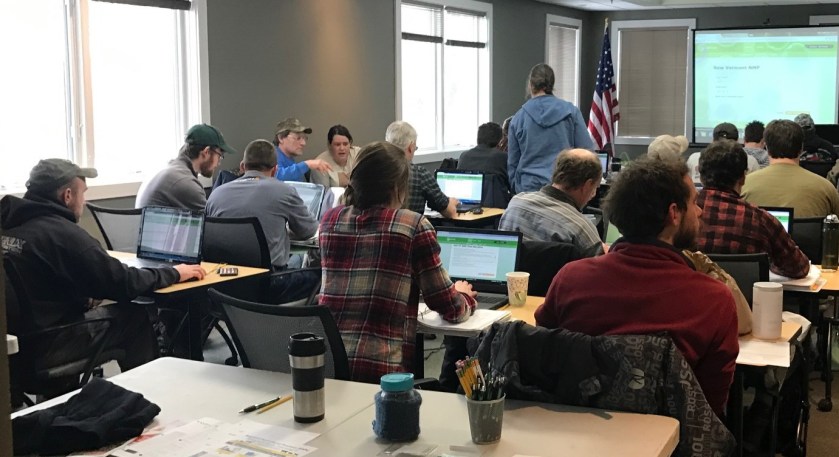A Newsletter Spotlight, From Summer 2020 Newsletter
View the Newsletter in Full Here
This article is based on:
George Foster and son Jeremy manage crop production on the Foster family’s fifth generation 2,200-acre dairy farm in Addison County, Vermont. They grow 550 acres of corn silage, 300 acres of soybeans, 100 acres of small grains, and 1,250 acres hay/haylage each year on their farm, which is predominated by Vergennes heavy clay soils. The family not only sells milk through the Agri-Mark Family Dairy Farms® cooperative where it is made into world-famous cheese, but they also operate Vermont Natural Ag Products—home of the Moo™ line of compost and soil amendment products.
Today George has become a humble, yet impactful leader of a soil health movement in Vermont. While the farm has always had a conservation ethic, George and Jeremy have dramatically changed their cropping systems over the last eight years. After some failed attempts at no-till 20 years ago, George attended the UVM Extension No-Till and Cover Crop Symposium and that was when he knew he could make it work on their farm. He had a solid vision and took a pragmatic approach to implantation of these practices.
The Fosters agreed to help us investigate on the economic plusses and minuses of cover cropping and no-till through a state Natural Resource Conservation Service (NRCS), Conservation Innovation Grant (CIG).
Making the Transition
After acquiring a new no-till corn planter in 2012, the Fosters began transitions by applying no-till on their lighter soils utilized for corn silage, and then fields going into first-year corn silage on their clay fields, while simultaneously adding cover cropping. Paying good attention to nitrogen management was key to maintaining and increasing yields. Adjusting equipment was important, and they now have a roller-crimper and no-till drill in addition to the no-till corn planter. All of their crops and cover crops are now no-till and they grow their own cover crop seed!
Why Cover Crops?
When you ask George why he grows cover crops, he’ll tell you, “It’s what makes no-till work!”He’s sure it’s the reason no-till didn’t work 20 years ago when they first tried it. He explains that the cover crop roots open the soil while the leaves protect the soil surface. He has observed many of the benefits we often espouse like improved water infiltration/management, increased organic matter, increased soil biology, improved soil structure, reduced compaction, and resilient crops leading to more reliable yields which are less stressed by weather extremes.
Cost of Entry
Cost of entry of conservation practices is a common challenge and concern for producers. To manage these costs, spacing out investments, borrowing equipment, hiring custom work, cost sharing and grant funding are all ways producers manage these investments. Foster Brothers Farm utilized all these approaches. Out-of-pocket expenses made up roughly 53% of the equipment cost. Divided over their corn acres, the equipment was paid for in 5 years. Including soybeans and small grains, it only took 3 years to see a return on investment.
Changes in Costs Associated with Cover Crops and No-Till
In this project we calculated economic cost estimates (not actual cash expenses), with producer interviews and the NRCS Machinery Cost estimator (Cover Crop Economics Tool, version 3.1). Foster Brothers Farm saw an increase in costs related to planting the cover crop and use of a roller crimper for termination of cover crop. Cost decreases were seen in labor, plowing and harrowing (see graph). The net effect of these changes is approximately a $45 / acre decrease in cost as compared to conventional tillage on this farm.
Compared to their previous tillage system, this method requires less labor, leads to better crop quality, reduces/eliminates replanting costs, increases yields, and provides more resiliency to wet springs and dry summers. Their corn yields have been steadily increasing and their soybean fields saw a substantial increase. More efficient spring operations and changes in new hay seedings improved earnings.
George is still tweaking the cover crop system with his soybeans, and he is mindful that avoiding compaction is more important than ever. He reminds farmers who are trying no-till to be patient in the spring and check underneath the surface before planting.



